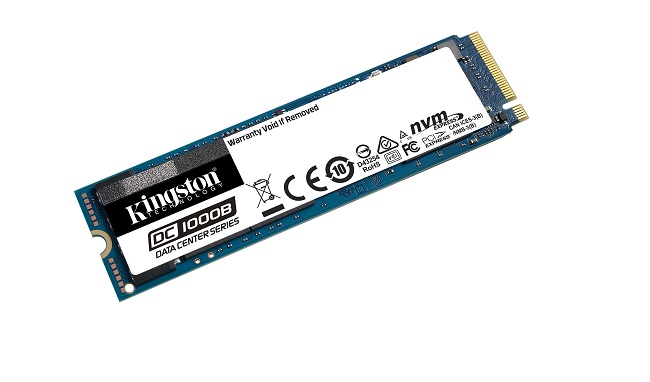Kingston Technology has announced a new range of NVMe SSDs for data centre solutions. The Data Centre DC1000B M.2 NVMe is optimised for server boot applications and equipped with power-loss protection (PLP).
The new Data Centre DC1000B range from Kingston is a high-performance M.2 (2280) NVMe PCIe SSD utilising the latest generation PCIe Gen 3.0 interface and 64-layer 3D TLC NAND, to offer data centres a cost-friendly M.2 NVMe solution specifically designed for server use.
Kingston claims the DC1000B is optimally suited for server boot applications in high-volume rack mount systems, as well as being suitable for use in purpose-built systems needing a high-performance M.2 SSD that includes onboard power loss protection (PLP). The DC1000B provides an efficient server boot solution while preserving front-loading bays for data storage drives.
Kingston Data centre DC100B features:
- Data Center Class SSD for Enterprise applications
- Optimized Boot Drive for Server Use
- M.2 PCIe NVMe Gen3 x4
- Up to 3,400MB/s Read, 600MB/s Write
- Part Number: SEDC1000BM8/240G
The DC1000B is designed to offer enterprise-level performance and consistency, with low latency features not typically included in client SSDs. Kingston has launched the DC1000B available in two capacity options of 240GB and 480GB, to keep the price relatively low. However, at the moment, specific pricing information is unavailable.
Discuss on our Facebook page HERE.
KitGuru says: Kingston says the DC1000B will offer a cost-effective NVMe solution for server boot drives. However, there is no reason why the DC1000B couldn’t be used as a desktop storage drive too. It will be interesting to see how cost-effective it is once it hits retailers.
 KitGuru KitGuru.net – Tech News | Hardware News | Hardware Reviews | IOS | Mobile | Gaming | Graphics Cards
KitGuru KitGuru.net – Tech News | Hardware News | Hardware Reviews | IOS | Mobile | Gaming | Graphics Cards



